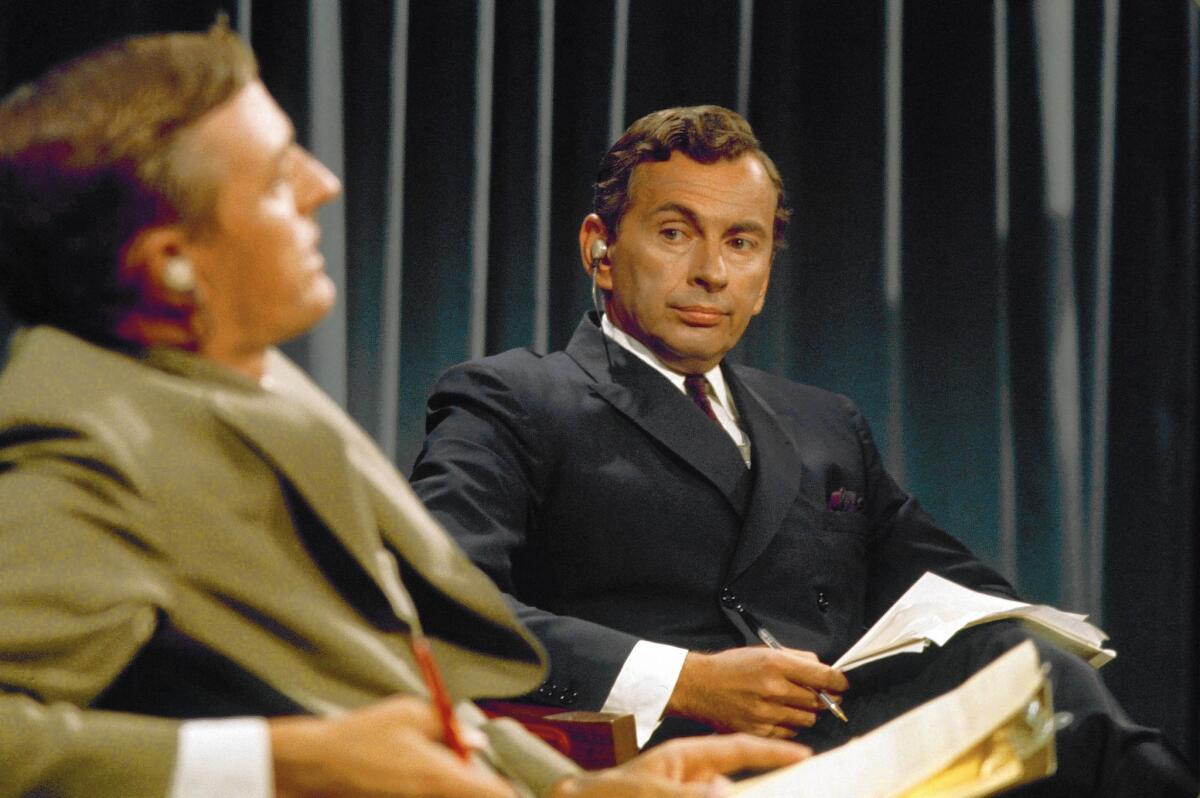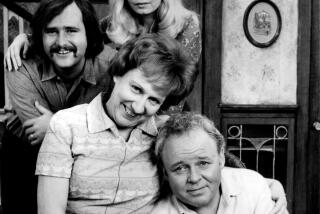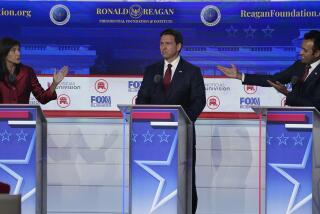‘Best of Enemies’ shines a light on fiery Buckley-Vidal debates

William F. Buckley Jr., left, engages in intellectual combat with Gore Vidal on ABC in 1968.
ABC News was last in the ratings in the summer of 1968, behind NBC’s team of Chet Huntley and David Brinkley and Walter Cronkite on CBS. It was desperate to gain an edge on the more established networks’ news teams.
So ABC decided to try something different, hiring William F. Buckley Jr., the guiding light of the-then “new conservatism” to debate writer Gore Vidal, a Democrat and cousin of Jacqueline Kennedy, during the Republican and Democratic conventions. They had long been ideological enemies and had twice debated before — once on David Susskind’s show “Open End” in 1962 and at the Republican convention in 1964.
“Best of Enemies,” a new documentary from directors Morgan Neville (“20 Feet From Stardom”) and Robert Gordon (“Respect Yourself: The Stax Records Story”) opening Friday, chronicles the 1968 debates with clips and vintage interviews with the late Buckley and Vidal, as well as interviews with people who knew them, including Dick Cavett, the Emmy Award-winning former talk show host on ABC and PBS.
SIGN UP for the free Indie Focus movies newsletter >>
“They truly believed that the other person, given a chance, would destroy the nation; that everything that person believed in was going to be the ruin of the country,” said Neville. “It was their job to take out the other.”
Ironically, the two men were very similar. They were both born into upper-class families. They both spoke in patrician accents, with Buckley’s eccentricities and florid vocabulary fodder for impressionists. They both had run unsuccessfully for public office.
“I think that explains why they found the other person their bête noir,” said Neville. “ It was like looking at a fun house mirror of themselves. It made them deeply insecure and lash out. I think the thing that made them head down two different paths were sex and God.”
Buckley, who died in 2008 at age 82, made a splash in 1951 with his first book, “God and Man at Yale,” at age 25. He founded the National Review magazine in 1955, and his newspaper column On the Right was syndicated for several decades. He was the host of the PBS interview series “Firing Line” for three decades. He was also a conservative Roman Catholic, rejecting Vatican II and attending only Mass spoken in Latin.
ALSO: New book ‘Buckley and Mailer’ offers insight into intellectual culture of an era
Vidal stated shortly before his death in 2012, at age 86: “If you cut me open, there is ice water in my veins.” His third novel, “The City and the Pillar,” caused a sensation in 1948 because it dealt with a gay relationship. His bestselling 1968 satirical novel, “Myra Breckinridge,” which Buckley harped on in the debates, dealt with pansexuality. He wrote a series of novels on U.S. history, including the acclaimed “Burr” and “Lincoln.”
“Buckley was a good writer,” said Cavett, who was friends with both men and frequently had them as guests on his ABC talk show. “Gore was a great writer. He has been called the best essayist, and it’s true. Buckley was kind of flashy and often a quite witty writer and witty man.”
“Best of Enemies” co-director Gordon learned about the debates five years ago from a friend, a Memphis, Tenn., college professor who had long been intrigued by them.
Through a cousin of Vidal’s, Gordon got a DVD copy. “He shared them with me, and I was struck immediately by the way they articulated the present culture wars,” Gordon said.
Not only did the story have these two “huge characters,” said co-director Neville, “it seemed to say a lot about the media. It is ultimately a cautionary tale about media.”
The filmmakers interviewed Vidal in 2010. It didn’t go well.
“We didn’t use it,” said Gordon. “It was the most intimidating interview I have ever done. We did a lot of homework and put a lot of effort into organizing the questions. He seemed to sabotage the interview. He was disdainful of being placed on the same plane as Buckley. He disagreed with the premise of our film and the only way Vidal and Buckley should be in the same sentence is with the word ‘conquered’ in between. He thought Buckley was beneath his contempt.”
Perhaps the most well-known exchange came during the penultimate debate at the 1968 Democratic National Convention in Chicago. Buckley lost his composure after Vidal called him a “pro-crypto-Nazi.” Buckley angrily replied to Vidal, on live TV: “Now listen, you queer, stop calling me a crypto-Nazi.” Buckley continued that he would sock him in his face and “you’ll stay plastered.”
Cavett recalled watching all three networks’ coverage on his televisions live that evening. “I saw something was happening on the ABC side,” he said. “So I saw it.”
Though the network might have been initially shocked at Buckley’s vitriolic response, noted Cavett, ABC was “delighted” that the debate caused a stir the next day. The debates, he added, “were such a soaring success it really put them on the map for the first time really in a big way.”
Cavett lamented that television always wants to “imitate and steal success,” which led to a “spate” of copycat TV including the “Point-Counterpoint” segments on CBS’ “60 Minutes” between liberal Shana Alexander and conservative James J. Kilpatrick.
“It just got dreary and boring,” said Cavett. “It was never done as well as that night with those two. There isn’t anybody around like them.”
In 1969, Buckley and Vidal wrote pieces about the debates in Esquire. Buckley sued Vidal and the magazine after Vidal’s article, “A Distasteful Encounter With William F. Buckley Jr.,” was published. Vidal countersued. In 1972, Buckley dropped the suit against Vidal.
Though Vidal said he put the debates behind him, Buckley never did.
Though his outburst, said Cavett, “didn’t ruin Buckley’s life, you see in the documentary it haunted him for the rest of his life.”
Twitter: @mymackie
SIGN UP FOR OUR ENTERTAINMENT NEWSLETTERS:
Indie Focus: Your field guide to only good movies
Classic Hollywood: A weekly email celebrating the Golden Age of Hollywood
Essential Arts & Culture: A curated look at SoCal’s wonderfully vast and complex arts world
More to Read
Only good movies
Get the Indie Focus newsletter, Mark Olsen's weekly guide to the world of cinema.
You may occasionally receive promotional content from the Los Angeles Times.







